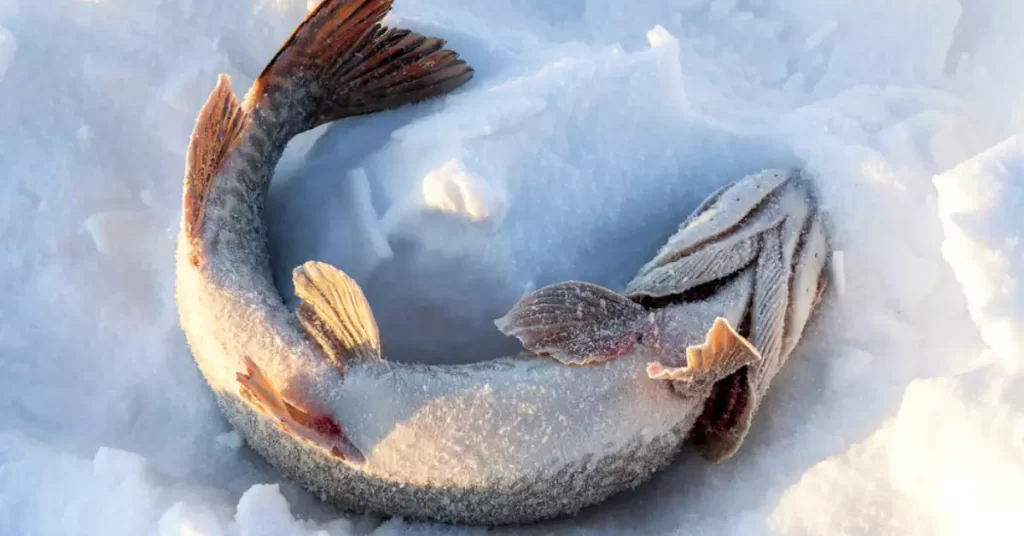Have you ever wondered what happens to fish when they encounter freezing temperatures?
Can they survive being frozen solid, and if so, how do they come back to life?
This fascinating article delves into the world of fish and their remarkable ability to withstand freezing conditions.
We’ll explore the science behind this phenomenon, the species of fish that can survive freezing temperatures, and the implications of this survival tactic for the broader ecosystem. Let’s dive in!
What Happens When Fish Encounter Freezing Temperatures?
Fish and Cold Environments
Fish, like all living organisms, need to maintain their internal temperature within a certain range to survive.
Cold environments can pose a challenge to fish because their bodies are primarily composed of water, which can freeze at low temperatures.
However, some fish have evolved unique strategies to survive in these cold conditions.
The Freezing Process
When water turns to ice, it forms a crystalline structure that can cause damage to the cells and tissues of organisms.
In the case of fish, this could lead to death if not managed properly. But how do some fish manage to survive this freezing process?
Fish That Can Survive Freezing
Antifreeze Proteins
Some species of fish have evolved to produce antifreeze proteins (AFPs) that bind to ice crystals and prevent them from growing.
These proteins help fish survive freezing temperatures by preventing ice from damaging their cells and tissues.
The Arctic and Antarctic Fish
Fish that live in Arctic and Antarctic waters, such as the Arctic cod and Antarctic icefish, have developed unique adaptations to survive in these frigid environments.
These fish produce AFPs that allow them to tolerate freezing temperatures without being harmed.
Freeze Tolerance in Other Species
Some species of fish, like the North American wood frog and the Siberian salamander, can tolerate being frozen for short periods of time.
These species produce large amounts of glucose, which acts as a cryoprotectant to protect their cells from freezing damage.
How Do Fish “Come Back To Life” After Freezing?
Thawing Process
When frozen fish are exposed to warmer temperatures, the ice in their bodies begins to melt, and their cells and tissues return to their normal state.
As long as the fish’s vital organs have not been damaged by ice crystals, they can “come back to life” and resume normal bodily functions.
Gradual Thawing
The key to a successful revival of a frozen fish is a gradual thawing process. Rapid thawing can cause cellular damage, whereas a slow thaw allows the fish’s cells and tissues to recover from the freezing process without sustaining additional damage.

Implications of Fish Freezing Survival
Ecological Impact
Fish that can survive freezing temperatures play an important role in maintaining the balance of ecosystems in cold environments.
These species serve as a food source for predators and contribute to the overall biodiversity of their habitats.
Climate Change Adaptation
As global temperatures continue to fluctuate due to climate change, the ability of fish to survive freezing conditions could become increasingly important for their survival.
Understanding the mechanisms behind this phenomenon can help scientists develop strategies to protect vulnerable species and ecosystems.
Human Uses of Fish That Can Survive Freezing
Cryopreservation in Science and Medicine
The study of fish that can survive freezing has provided valuable insights into the field of cryopreservation.
Understanding how these fish tolerate freezing conditions can help researchers develop more effective methods for preserving biological samples, tissues, and organs at low temperatures.
Applications in the Food Industry
Fish that can survive freezing can also be of interest to the food industry.
The ability to preserve fish at low temperatures without damaging their cells and tissues could lead to improved methods for preserving and transporting seafood, ensuring better quality and longer shelf life.
The Limits of Fish Freezing Survival
While some fish can survive being frozen for a time, it’s important to note that this ability has its limits.
Factors such as the duration of freezing, the rate of thawing, and the extent of ice crystal formation can all influence the fish’s chances of survival.
Moreover, not all fish have the necessary adaptations to survive freezing conditions.
Frequently Asked Questions
How do antifreeze proteins work in fish?
Antifreeze proteins work by binding to small ice crystals in the fish’s body, preventing them from growing and causing damage to cells and tissues.
This allows the fish to survive freezing temperatures without harm.
Can all fish survive being frozen?
No, not all fish can survive being frozen. The ability to tolerate freezing temperatures is an adaptation found in specific species that live in cold environments, such as the Arctic and Antarctic waters.
How long can fish survive being frozen?
The duration of a fish’s survival in a frozen state varies depending on the species and the conditions they are exposed to.
Some fish can survive being frozen for days or even weeks, while others can only tolerate short periods of freezing.
Conclusion
The ability of some fish to freeze and come back to life is a fascinating example of nature’s resilience.
By producing antifreeze proteins or other cryoprotectants, these fish can survive in freezing environments that would be lethal to other species.
This remarkable adaptation has significant ecological implications and offers valuable insights into the fields of cryopreservation and climate change adaptation.
As we continue to explore and understand the world around us, the study of these remarkable creatures can help us develop new technologies and strategies to preserve our planet’s precious biodiversity.